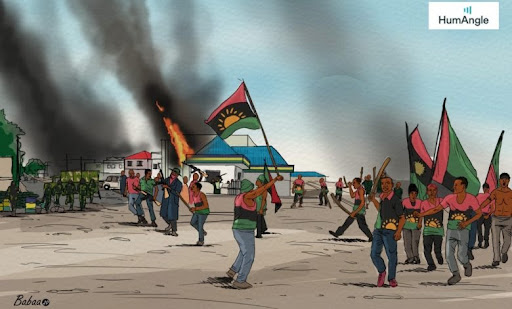Separatist Agitation Resurfaces As Attacks On Police In Southeast Nigeria Return
Many people living in Imo State, Southeast Nigeria have expressed concern as non-state actors, suspected to be separatists, resumed attacks on police stations and its personnel.

“The separatist have started again and they are already attacking police stations. I lost another friend again last week,” a police inspector leading the squad combatting armed men terrorising Imo State, Southeast Nigeria, told HumAngle on Monday.
The latest incident brought the total number of his friends killed in the agitation war of the Indigenous People of Biafra (IPOB) to six since January 2021. The slain officer is one of those that shared their bitter experiences with our reporter during an earlier investigation on attacks on police stations in the region.
HumAngle understands that no fewer than six police personnel have been killed in what appears to be renewed attacks on police facilities in Imo between Friday, March 18, and Sunday, March 20, 2022
The non-state actors on March 19, attacked Umuguma Divisional Police Headquarters situated in the Owerri West LGA of the state, killing two police constables on duty, burning vehicles and freeing suspects in cells.
Same night, they attacked the country home of the President-General of Ohanaeze Ndigbo— an apex Igbo socio-cultural group in Nigeria— George Obiozor, at Awo-Omamma in Oru East LGA. This was followed by another attack on the Omuma Divisional Police Headquarters in Oru East LGA on March 20. The incident led to the death of four officers.
The weekend’s attack was not the first. A group had, in July 2021, attacked the Omuma station, killing the Divisional Police Officer and four others on duty.
Governor Hope Uzodinma met with President Muhammadu Buhari on Monday, March 21, and the commander-in-chief of the armed forces ordered the deployment of more security operatives and weapons to battle the menace of ‘gunmen’ in the state.
Residents, police live in fear
Despite assurances of safety given to them by the government, residents believe that their lives are in danger. HumAngle had telephone interviews with some residents living in Umuna, Okporo, Awo-Omama, Owerre Ebeiri, and Ihioma in Orlu LGA.
“There is fear in Orlu as I speak to you because the IPOB members have resumed attacks on police stations. We are scared that by the time the security guys start retaliating, many innocent people will lose their lives,” said Okolie Ngozi. “I am even scared of sending my kids on errands because they can attack at any time.”
Ngozi’s husband, Aloysius, was a mechanic in Okporo, a community in Imo’s Orlu LGA. Fondly called “Oluwa” by his family and friends, he was shot dead by armed persons who attacked the community on Aug. 2, 2021. The assailants, who were said to be “IPOB militants,” also destroyed various shops in the community for not obeying their sit-at-home order.
“I have since been scared and would not want to lose any of my children like I lost my husband,” she stressed, saying fear has enveloped different communities since the return of attacks on police stations last weekend.
A motorcyclist who spoke under anonymity for fear of attack said most of the distressed residents in various communities hardly sleep at night.
Some police personnel also told HumAngle that ‘gunmen’ are ambushing them in rural communities as they “fight the criminals with rickety patrol vehicles and poor weapons, making us vulnerable to attacks.”
What does IPOB want?
The aim of the separatist organisation, IPOB, is to create an independent state of Biafra in the Old Eastern Region of Nigeria, comprising the current Southeast and South-South regions.
It was founded in 2012 by Nnamdi Kanu, who had spoken at gatherings where he threatened Nigerian authorities and called for Biafra’s independence. At various times, he referred to Nigeria as a zoo, urging his loyalists to take up arms against the state.
“We need guns and we need bullets. It’s either Biafra or death,” he said in a 2017 interview. Kanu was arrested and charged with treasonable felony, unlawful possession of arms, and illegal importation of broadcast equipment at a Federal High Court in Abuja in 2015.
He was granted bail on medical grounds in 2017 after spending 18 months in incarceration. He later jumped bail and fled the country, claiming that he feared for his life after security operatives raided his home in a standoff that left some people dead.
Almost four years later, Kanu was recaptured and he has since June 29 remained in detention.
Anarchy reigns
HumAngle earlier reported how the violent activities of non-state actors are eclipsing communities and cities in the Southeast. With security deployment and counter attacks, it is looking like the early stages of a full-blown insurgency.
While the burgeoning anarchy in the Southeast bears no religious imprints like the insurgency in Northeast Nigeria, its intolerance of any contrary views and use of extreme force on victims may bear similar result with the jihadist insurgents.
Support Our Journalism
There are millions of ordinary people affected by conflict in Africa whose stories are missing in the mainstream media. HumAngle is determined to tell those challenging and under-reported stories, hoping that the people impacted by these conflicts will find the safety and security they deserve.
To ensure that we continue to provide public service coverage, we have a small favour to ask you. We want you to be part of our journalistic endeavour by contributing a token to us.
Your donation will further promote a robust, free, and independent media.
Donate HereStay Closer To The Stories That Matter




